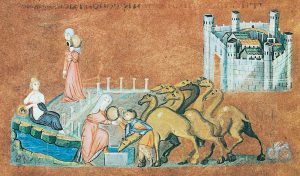Peter writes: As Nerys said last Sunday, in spite of their happy endings, these episodes from the life of Abraham contain elements that we, some 5000 years later, find unacceptable.
There is his refusal to allow Isaac to marry outside his own ethnic background in today’s reading, Genesis 24.34-38, 42-49, 58-67. Thinking of my own lovely daughter-in-law of Chinese heritage, I have to ask “What is wrong with that?” Then there is the way the bride was chosen and the fact that she was brought from another country. In our culture we tend to disapprove of arranged marriages. In the Church of England nowadays, clergy have to check very carefully before calling banns of marriage – is it a forced marriage or an attempt to evade the ever-stricter immigration laws?

Rebecca at the Well, Vienna Genesis, 6th century
Even worse in our eyes is the fact that Abraham owned many slaves and this was regarded as a source of pride. Slavery in the ancient world was often a consequence of poverty and his female slaves had probably been sold to him by their fathers. Nevertheless, historians tell us that slavery at that time was nothing like the shameful brutal and cruel treatment suffered by African slaves in America and the Caribbean. In fact, masters could be prosecuted if they mistreated a slave. Their situation was perhaps more like that of farm labourers or domestic servants in this country in the 18th and 19th centuries.
So we need to view the past – whether biblical or otherwise – through the lens of history; if humans are still around in 5000 years, what will they make of our attitudes and cultural norms?
Turning to Paul’s letter to the Christians in Rome, the psychological state he describes in Romans 7.15-25, could be compared with slavery. He calls himself a “captive”, who cannot help himself from doing what he knows to be wrong and is unable to do what is right. Like a slave, he is being coerced and elsewhere in his letters he talks of being enslaved. Similarly Jesus describes the reaction of his listeners with that colourful metaphor: “We played the flute to you and you did not dance; we wailed to you and you did not mourn”. Like slaves, our freedom of thought and action is fettered and in Paul’s view there is little we can do about it because we are “in the power of the law of sin”. In the words of Private Frazer in Dad’s Army, “We’re doomed!”
Or are we? In the ancient world many slaves were often freed after six years or for other reasons. Paul’s listeners would have known this and would readily understand why he wrote “Who will rescue me from this body of sin? Thanks be to God through Jesus Christ our Lord!”
Hints as to how he could write this are contained in today’s reading from St Matthew’s Gospel, 11.16-19, 25-30: “Come to me, all you that are weary and are carrying heavy burdens” – slaves in their day were not allowed to be overworked – “and I will give you rest” – slaves were entitled to Sabbath rest and in the age to come we shall all rest from our labours. “For I am gentle and humble in heart”. This is the same example for Christian living as “Blessed are the meek, for theirs is the kingdom of heaven”.
It is not a pattern based on the many burdens imposed by the many and petty rules of the “wise and intelligent” but on the simple rule of “Love your neighbour as yourself”. This is Jesus’ easy yoke revealed to babes and infants.
FOR PRAYER AND REFLECTION
We pray to the Lord, whose service is perfect freedom –
for couples preparing for marriage and those married recently; that in binding themselves one to another they may find fulfilment and joy;
that those who think themselves wise in the world may learn to trust the wisdom of the simple;
for the victims of people trafficking and modern slavery; for organisations working to release them from their situation; for countries still bearing the burdens of past slavery;
that we may be more gentle and humble in our dealings with others, giving them relief from their burdens;
for all who are bearing the heavy loads of poverty, war, oppression or the weight of unresolved sin;
for those we know who are wearied through illness or sorrow; that they may find comfort and relief;
for the departed, that they have laid down their burdens and found eternal rest.






